A younger Marcos had been forced to run to safety on the evening of February 25, 1986, during the People Power uprising, in the same hallways where he had received Blinken. Marcos and his family were eventually banished to Hawaii until 1991 after a covert evacuation that was sponsored by the US government during the Reagan administration.
Jose Cuisia, a former Philippine ambassador to the US, said in a previous interview with Rappler, "I'm sure they're discussing it (history)". The crowds were prepared to use violence against the Marcoses when Malacaang was ransacked, he continued. "But they also have to remember that had the US not plucked the family out," he said.
They should keep in mind that the US saved them, not just the family but also some of their friends, Cuisia remarked.
The US had supported military rule in the Philippines before to the fall of the late dictator's administration, despite extensive corruption and violations of human rights.
The Marcoses were forced to deal with a barrage of accusations regarding human rights breaches and illicit money that had been accumulated during the rule of their late patriarch years later, when they were exiled in America. "You have no immunity at all here in the United States, they (the Marcoses) were warned. Over a hundred lawsuits must have been brought against them within ten days or two weeks, Robert Rich Jr., who was serving as deputy chief of mission at the US embassy in Manila at the time, remembered in an interview with the media in 1994.
For the younger Marcos, the "difficult" time will always be a source of pain. Marcos was held accountable for several of his family's sins following the death of his father in 1989. He was also left to deal with its legal matters as the father's son, one of which was a standing contempt ruling handed down by a US court in connection with a class action involving human rights.
Because of the case, Marcos has been unable to visit the US for years; however, given that he is currently the head of state, this obstacle may soon disappear.
At least for now, Marcos seems to be thinking differently. Marcos has expressed his openness to strengthen ties with Washington, in contrast to Duterte who had attempted to sever ties with the US. Despite his own troubled background, the president of the Philippines has frequently called the nation a "vital" ally of Filipinos.
In a call with President Joe Biden, who had been the first head of state to call and congratulate the new Philippine leader, Marcos personally expressed his intention to fostering closer ties with the US shortly after his resounding victory.
Later, at his meeting with Blinken, Marcos emphasized that the Philippines and the US, with whom it shared a Mutual Defense Treaty, would strengthen their military ties (MDT). We are no longer able to separate the different facets of our relationship. Due to the unique relationship between the United States and the Philippines and the shared history, we are too deeply entwined, according to Marcos.
These led Derik Grossman of the RAND Corporation, a defense expert, to observe that Marcos' aims "appears to be the exact reverse of Duterte's, who tried to deliberately dissolve the alliance, one accord at a time."
According to an analysis by Grossman, "that is beneficial for Washington and very definitely signals a reference to the elder Marcos's emphasis of the partnership."
The result is encouraging for the US, which has made efforts to strengthen its relationships in Asia as it contends with growing Chinese competition.
Washington ought to be supportive of some of Marcos' political stances, such as his desire to see the Philippines bolster its defenses. It would "fit easily into the Biden administration's so-called integrated deterrence strategy, in which US friends and partners work together to deter China and other threats, such as Russia," according to Grossman.
After relations between the US and its longtime ally the Philippines reached their lowest point under the Duterte administration, US security and diplomatic officials have shown fresh interest in their country's ties with the Philippines.
The Biden administration named senior career diplomat Ambassador MaryKay Carlson as its envoy to Manila in an effort to avoid further strained relations with the Philippines, which it can no longer afford in the region. To date, the administration has stated its willingness to cooperate with the Marcos regime.
Along with expanding its military partnerships, the US government has also started economic initiatives in clean energy and agriculture, two fields that the leader of the Philippines has prioritized highly. Although US officials have stated that they will bring up human rights concerns with the Marcos administration, it is unclear whether specific cases have been brought up, such as the deterioration of press freedom, extrajudicial killings committed as part of Duterte's brutal drug war, or the ongoing detention of former senator Leila de Lima.
Blinken had also emphasized in Manila that the countries' MDT covered the South China Sea, where the Philippines and the Asian powerhouse are embroiled in a territorial dispute.
a happy memory
Marcos and his family have had happier recollections with China than with the US, which has a difficult past with them.
The Philippines became one of the first nations in the world to establish diplomatic ties with Beijing in 1975 when Ferdinand Marcos' father decided to promote relations with the government of the People's Republic of China. This decision was made during the Cold War era.
The establishment of formal connections was made possible by Imelda Marcos, the president's mother, who traveled to China in October 1974 while serving as a special presidential envoy. The younger Marcos traveled with his mother, and by doing so, the family met Mao Zedong, who was the country's leader at the time.
One of Imelda's most well-known encounters with a foreign leader would later result from the meeting between the Marcoses and Mao. Imelda's fingers were kissed by Mao when she was holding her hand.
He grasped my hand and kissed it, and it was the beginning of the end of the Cold War," Imelda later gushed about the act, which she regarded as one of her "proudest moments." Imelda stated to Agence France-Presse in 2009 that the Philippines was America's junior partner.
Mao kissed his mother's hand after which the younger Marcos eagerly took hold of Mao's hands and moved to kiss each of the Chinese leader's cheeks. While the picture of Mao and Imelda would later make headlines, AP footage of the meeting captured a moment frequently missed in accounts of the meeting.
The trip would strengthen the Marcoses' close ties to China. The Marcoses maintained friendly ties with Chinese authorities even while they were out of the public eye.
The Marcos family's stronghold of Laoag, Ilocos Norte, now has a consulate from the Chinese Ministry of Foreign Affairs. Imelda was also given a prize in 2021 by the Chinese embassy and the Association for Philippines-China Understanding, which honored Filipinos for fostering "mutual understanding" between Beijing and Manila.
China had also been one of the first nations to contact Marcos after he won the presidency.
Due to these personal ties, some analysts believe Marcos will bring the Philippines closer to China. They contend that the President will benefit more from this since Beijing has stated it will fund infrastructure and agricultural projects under his administration.
Some people are more upbeat. Like Duterte, some experts believe Marcos is better suited to develop more fruitful relations with China because to his family history. According to Aaron Jed Rabena, an analyst at the Asia-Pacific Pathways to Progress research organization, "this (history) does not necessarily mean that Bongbong will be soft on China, especially if he looks back to his father's legacy for lessons on how to deal with Beijing, or neglectful of the need to also be in good terms with Washington."
Given China's unstoppable economic and geopolitical weight, he continued in an opinion post, "Bongbong's readiness to interact with China, like Duterte's, is largely motivated by pragmatism, and perhaps some personal recognition of the significance of the bilateral relationship.
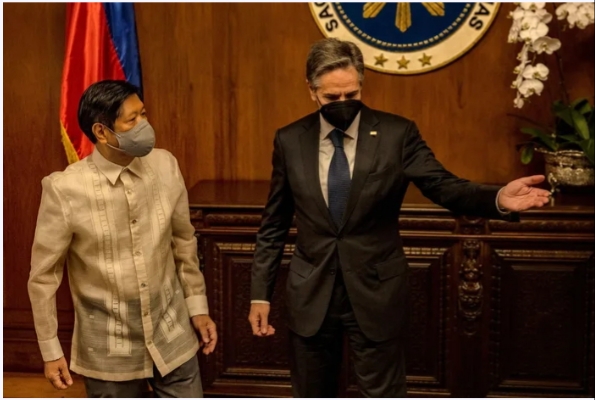
COURTESY CALL: On June 30, 2022, Vice President of China Wang Qishan visits President Ferdinand "Bongbong" Marcos Jr. after the latter's inauguration at the National Museum of Fine Arts.
Similar to the US, Chinese officials were quick to court the new Philippine president. Wang Qishan, vice president of China, was sent to attend Marcos' inauguration, and Wang Yi, foreign minister of China, claimed the distinction of being the first foreign minister to meet with Marcos.
However, friendly relations between Manila and Beijing continue to exist only on an official basis, much like previous Philippine governments.
In spite of the Marcos family's extensive ties to China, a recent poll by Pulse Asia revealed that as of June 2022, only 3 out of 10 Filipinos thought the Philippines should trust China. Filipinos, on the other hand, continue to have the highest level of trust in the US, with nearly 9 out of 10 stating that the Philippines should have faith in its steadfast partner.
Despite the strong relations between the Marcoses and China, the West Philippine Sea issue, in which Chinese ships have displaced Filipino fisherman and asserted Beijing's claims in Philippine seas, continues to shape how the majority of Filipinos view and feel about the Asian superpower.
Marcos has shown signs of understanding the boundaries of his relationship with China. Marcos swore he "would not preside over any process that will cede even one square inch of territory of the Republic of the Philippines to any foreign power" at his inaugural State of the Nation Address.
Standing ovations were given for the declaration, which contrasted sharply with the defeatist stance Duterte had taken up until the end of his presidency. This stance benefited China and hampered the Philippines' efforts to defend its rights in the West Philippine Sea.
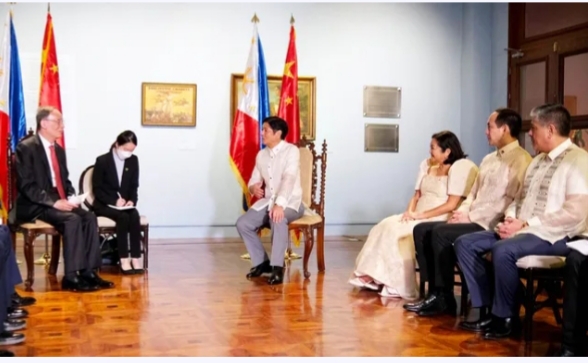
COURTESY CALL: On June 30, 2022, Vice President of China Wang Qishan visits President Ferdinand "Bongbong" Marcos Jr. after the latter's inauguration at the National Museum of Fine Arts.
Similar to the US, Chinese officials were quick to court the new Philippine president. Wang Qishan, vice president of China, was sent to attend Marcos' inauguration, and Wang Yi, foreign minister of China, claimed the distinction of being the first foreign minister to meet with Marcos.
However, friendly relations between Manila and Beijing continue to exist only on an official basis, much like previous Philippine governments.
In spite of the Marcos family's extensive ties to China, a recent poll by Pulse Asia revealed that as of June 2022, only 3 out of 10 Filipinos thought the Philippines should trust China. Filipinos, on the other hand, continue to have the highest level of trust in the US, with nearly 9 out of 10 stating that the Philippines should have faith in its steadfast partner.
Despite the strong relations between the Marcoses and China, the West Philippine Sea issue, in which Chinese ships have displaced Filipino fisherman and asserted Beijing's claims in Philippine seas, continues to shape how the majority of Filipinos view and feel about the Asian superpower.
Marcos has shown signs of understanding the boundaries of his relationship with China. Marcos swore he "would not preside over any process that will cede even one square inch of territory of the Republic of the Philippines to any foreign power" at his inaugural State of the Nation Address.
Standing ovations were given for the declaration, which contrasted sharply with the defeatist stance Duterte had taken up until the end of his presidency. This stance benefited China and hampered the Philippines' efforts to defend its rights in the West Philippine Sea.
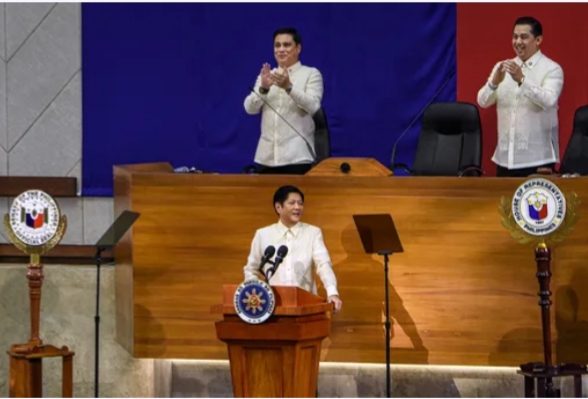
SONA. On July 25, 2022, as President Ferdinand Marcos Jr. gives his first State of the Nation Address, Senate President Juan Miguel Zubiri and House Speaker Martin Romualdez applaud.
juggling act
Nevertheless, the Marcos presidency is still in its early stages. Marcos' personal relationships with the US and China may be impacted by his complicated past, but his ability to lead the Philippines' foreign policy for the next six years will be his ultimate test.
There are already difficulties ahead as Marcos assumes power in the midst of a volatile geopolitical environment that necessitates a delicate strategy from the Philippines: the conflict in Ukraine; rising tensions in Taiwan, an island that borders the nation off the northern coast of Luzon; rising food prices; and the country's dwindling energy supply that may put pressure on the President to resume oil exploration activities in the West Philippine Sea.
Marcos has so far made an effort to find a compromise, declaring that the Philippines will uphold a stance of being "friends to everyone, enemies to none."
While the phrase has echoes of Duterte, according to Charmaine Willoughby, an associate professor at De La Salle University's Department of International Studies, the outlook could ground the nation's consideration of its relations with other countries - if Marcos remained conscious of its limitations.
The necessity for an overall plan rather than Duterte's inconsistent foreign policy, Willoughby added, is "a significant lesson here for the Marcos administration" and where the "friends to all" policy is a striking distinction. Although there is nothing inherently wrong with this viewpoint, we will unavoidably run with adversaries in international politics.
If the Philippines' main goal is to make friends with everyone, how do we handle situations where friends turn into foes? She continued,
In the West Philippine Sea, where the Philippines fights to regain lost territory after Duterte minimized the 2016 arbitral judgment, Marcos is expected to face this battle on a consistent basis. The nation's historic judicial triumph, also known as the Hague decision, established Filipino rights in the West Philippine Sea and declared China's claims to Philippine waters to be invalid.
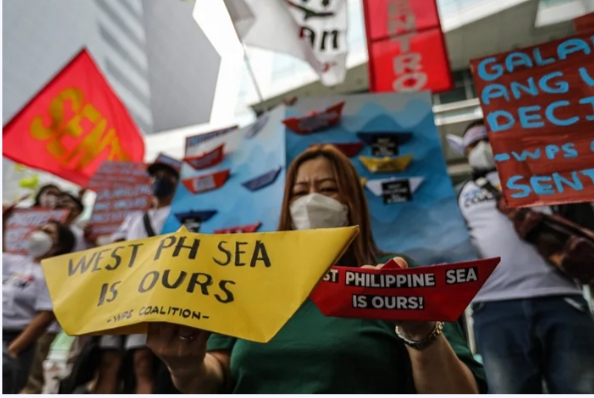
OURS. On July 12, 2022, protesters from the Sentro Youth and Akbayan Youth congregate near the Chinese Cultural Consulate in Makati City to mark the sixth anniversary of the Philippines' win in the UNCLOS tribunal on the disputed waters of the West Philippine Sea.
Enrico Gloria, an assistant professor of international relations at the University of the Philippines, claimed that hedging is now more challenging. "The dispute had not yet been settled when we hedged under (previous president Fidel) Ramos. But now that a judgement has been made, we must respect it because to do otherwise would be treacherous, he continued.
Using the proper language
The Marcos government seems to be acting appropriately thus far. The Hague judgement was handed to the Philippines at the beginning of Duterte's administration, although Marcos himself swore to respect it. The 2016 arbitral ruling would be based on the nation's West Philippine Sea policy and the United Nations Convention on the Law of the Sea, according to Enrique Manalo, the foreign secretary under the Marcos administration, who made this announcement during the award's sixth anniversary.
This, in Gloria's opinion, was a positive step. He argued that for the Philippines' foreign policy to effectively balance interests, it "must first and foremost establish its non-negotiables."
Experts have also considered Manalo's nomination as a recognized career diplomat with more than 30 years of experience as a good development that could improve Marcos' standing in the international community.
Meanwhile, Marcos' ambition to have commerce with foreign governments support the country's economic development and the ongoing US-China tensions, a flashpoint in Taiwan, could also act as reality checks.
According to Dominique Fraser, a researcher at the Asia Society's policy department, "While the US and China are both paying lip service to not having countries in the area choose a position, the room to maneuver without at least being perceived to pick a side is narrowing in."
After Duterte shook up the country's ties with his erratic policies, many officials and foreign capitals are now looking to Marcos and his Cabinet to restore stability, or at least consistency, in the Philippines' relationships with its partners.
Marcos' sweet spot?
The stakes are high for Marcos, but so are the rewards. Analysts believe Marcos has an opportunity to rebalance the country's policy and implement a more effective foreign policy strategy by pledging to prioritize the Philippines' national interests.
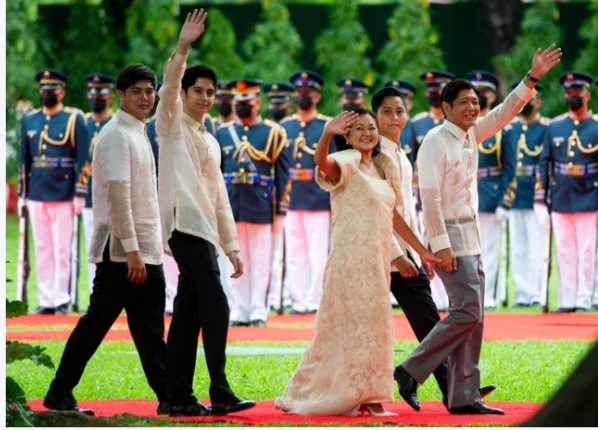
Following his inauguration on June 30, 2022, newly-elected Philippine President Ferdinand "Bongbong" Marcos Jr., his wife Louise Araneta-Marcos, and their three boys arrive at Malacaang Palace in Manila, Philippines.
Due to the tumultuous nature of Duterte's administration, which put the country's relationships with some of its closest allies to the test, Marcos now has a better chance than ever to win over the Philippines' partners. He has done this by forging friendly ties with the nations that have sent representatives to meet with him.
Since there are sincere intentions to develop relations on both (the US and China's) sides, Gloria added, "there is a sweet spot as far as Philippine foreign policy is concerned."
It might turn out that Marcos benefited from the timing of history.
"A confluence of all these factors, where you have tensions in Taiwan, where China is this perennially rising power competing with the US, and the US is in a decline — added with Duterte setting the stage and the nostalgia of Marcos — add it all up and it forces Marcos to adopt a balancing strategy that benefits both sides," Gloria said.
In the end, Marcos himself would stand to gain the most from a stronger foreign policy, not only the Philippines. After all, the Marcos' quest for redemption includes more than just managing the county's relations.



You must be logged in to post a comment.